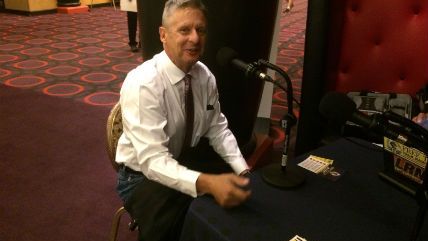The Libertarian Party Has Qualified for 39 More Ballots Than Evan McMullin
Green Party has confirmed 27 states so far; meanwhile the latest #NeverTrumper is about to start off his presidential campaign 0 for 33

As Nick Gillespie pointed out here earlier, latest #NeverTrump heartthrob Evan McMullin, who is trying to maintain at least a toehold of government influence for Goldman Sachs and the CIA, has a 26-state problem. Which is to say, he is already 0 for 26 in getting his name on state ballots as a candidate for president. But it's actually much worse than that.
Tomorrow is the ballot-access deadline for Alaska, Colorado, Connecticut, Hawaii, New Hampshire, Ohio, and the District of Columbia. That's right, in a little more than 24 hours, Bill Kristol's Great New Hope will likely start off his Electoral College career 0 and 33*.
"I've known from the beginning of all of these rumblings of an independent #NeverTrump candidate that they would run into all of the ballot access barriers that Republicans and Democrats have been putting up to suppress the Libertarians for years," Nicholas Sarwark, chair of the Libertarian National Committee, told me today via Direct Message. "If the latest white knight wants to spend Republican donor money to sue to break down unconstitutional ballot access barriers, I'm happy to let him do so."
So how many state ballots has L.P. presidential nominee Gary Johnson gotten on so far? "39 states as of this morning," Sarwark says. "Still forecasting 50 + D.C. No trouble spots beyond normal parameters."
The Green Party this afternoon announced that it has achieved ballot access in 27 states so far, "with petitions filed in [five] more states awaiting confirmation by state election boards," Media Coordinator Scott McLarty told me via email. "We expect to surpass the 37 states we had in 2012, which represented 82% of all voters."
In the lawsuit that was tossed out of District Court on Friday, the Green and Libertarian parties sought to lower the threshold for participating in the fall's presidential and vice presidential debates from the current 15 percent average in five selected national polls (plus mathematical ability to draw a majority of Electoral College votes) to just the ballot-access requirement. However, as Damon Root pointed out in the Morning Links, the Republican/Democrat-controlled Commission on Presidential Debates (CPD), has been making the mildest of noises that the duopoly might be considering some changes.
Politico reported today that the CPD has told debate venues to prepare for the possibility of a third podium on stage. And CPD co-chair Frank Fahrenkopf indicated to CNBC last week that the body might be open to altering its requirements. "If someone came in and let's say he was [polling] at 14.5 percent and the margin of error in five polls was 3 points, we are going to have to sit down and look at it," Fahrenkopf said. "But right now that person would not be included."
This suggests some willingness to heed public pressure. Toward that end, the Chicago Tribune has editorialized in favor of letting Johnson debate, a notion that has been seconded or amplified to include Jill Stein by the likes of Glenn Reynolds and others (including me in tomorrow's L.A. Times, hopefully).
At some point in this zany campaign season of unprecedented poll negatives, record-high L.P. enthusiasm, and near-record polling support for the Green, the CPD's institutional ass-covering will become a political liability. Just imagine the two-party duopoly trying not to crack up when compiling FAQs like this:
Why did CPD Select 15 Percent as the Polling Threshold for Inclusion in the Debates? The CPD first adopted the 15 percent level of support criterion in 2000. Its initial adoption, and its adoption in subsequent cycles, was preceded by careful study and reflects a number of considerations. It was the CPD's judgment that the 15 percent threshold best balanced the goal of being sufficiently inclusive to invite those candidates considered to be among the leading candidates, without being so inclusive that invitations would be extended to candidates with only very modest levels of public support, thereby jeopardizing the voter education purposes of the debates.
More accurately, as the League of Women Voters put it when relinquishing its participation in presidential debates and letting the CPD run full riot, "the demands of the two campaign organizations would perpetrate a fraud on the American voter….The League has no intention of becoming an accessory to the hoodwinking of the American public."
* Was "34"; also in the headline. Adding is hard.
